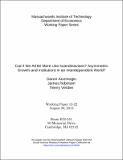| dc.contributor.author | Acemoglu, Daron | |
| dc.contributor.author | Robinson, James | |
| dc.contributor.author | Verdier, Thierry | |
| dc.date.accessioned | 2012-09-06T21:32:26Z | |
| dc.date.available | 2012-09-06T21:32:26Z | |
| dc.date.issued | 2012-08-20 | |
| dc.identifier.uri | http://hdl.handle.net/1721.1/72557 | |
| dc.description.abstract | Because of their more limited inequality and more comprehensive social welfare systems, many perceive average welfare to be higher in Scandinavian societies than in the United States. Why then does the United States not adopt Scandinavian-style institutions? More generally, in an interdependent world, would we expect all countries to adopt the same institutions? To provide theoretical answers to this question, we develop a simple model of economic growth in a world in which all countries bene.t and potentially contribute to advances in the world technology frontier. A greater gap of incomes between successful and unsuccessful entrepreneurs (thus greater inequality) increases entrepreneurial effort and hence a country’s contribution to the world technology frontier. We show that, under plausible assumptions, the world equilibrium is asymmetric: some countries will opt for a type of “cutthroat” capitalism that generates greater inequality and more innovation and will become the technology leaders, while others will free- ride on the cutthroat incentives of the leaders and choose a more .cuddly. form of capitalism. Paradoxically, those with cuddly reward structures, though poorer, may have higher welfare than cutthroat capitalists; but in the world equilibrium, it is not a best response for the cutthroat capitalists to switch to a more cuddly form of capitalism. We also show that domestic constraints from social democratic parties or unions may be beneficial for a country because they prevent cutthroat capitalism domestically, instead inducing other countries to play this role. | en_US |
| dc.publisher | Cambridge, MA: Department of Economics, Massachusetts Institute of Technology | en_US |
| dc.relation.ispartofseries | Working Paper, Massachusetts Institute of Technology, Dept. of Economics;12-22 | |
| dc.rights | An error occurred on the license name. | en |
| dc.rights.uri | An error occurred getting the license - uri. | en |
| dc.subject | cutthroat | en_US |
| dc.subject | capitalism | en_US |
| dc.subject | economic growth | en_US |
| dc.subject | inequality | en_US |
| dc.subject | innovation | en_US |
| dc.subject | interdependences | en_US |
| dc.subject | technological change | en_US |
| dc.title | Can't We All Be More Like Scandinavians? Asymmetric Growth and Institutions in an Interdepent World? | en_US |
| dc.type | Working Paper | en_US |
